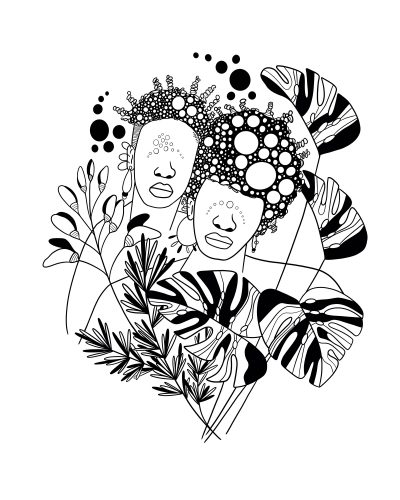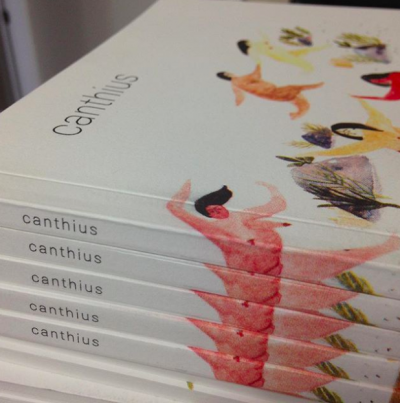
Founders
Canthius was founded by Puneet Dutt, Claire Farley, and Cira Nickel in 2015.
Current Team
AMY LEBLANC, MANAGING EDITOR
Amy LeBlanc is a PhD student in English and creative writing at the University of Calgary. Amy is the author of two books: I know something you don’t know (Gordon Hill Press, March 2020) and Unlocking (University of Calgary Press, June 2021). Her work has appeared or is forthcoming in Room, Arc, Canthius, Canadian Literature, and the Literary Review of Canada among others. She is the author of three chapbooks of poetry—most recently, “Undead Juliet at the Museum” (ZED Press, August 2021). Amy is a recipient of the 2020 Lieutenant Governor of Alberta Emerging Artist Award and a CGS-D Award for her doctoral research into fictional representations of chronic illness and gothic spaces. She is a 2022 Killam Laureate.
MANAHIL BANDUKWALA, DIGITAL CONTENT EDITOR
Manahil Bandukwala is a Pakistani writer and artist. Her project, Reth aur Reghistan, is an exploration of Pakistani folklore interpreted through poetry and sculpture, carried out with her sister, Nimra Bandukwala. She writes poetry with VII, an Ottawa-based creative collective. See recent work in the Malahat Review, CV2, Briarpatch, Augur, and other places. She holds an MA from the University of Waterloo. Her debut poetry collection is MONUMENT (Brick Books 2022). See her work on her website, manahilbandukwala.com.
TREE ABRAHAM, PUBLISHER & ART DIRECTOR
Tree Abraham is a book designer for publishers in Canada (where she’s from), the UK (where she studied), and the US (where she lives). Her best ideas come while swimming or reading the dictionary. When not designing, she can be found traveling to unmarked places, digging in dirt, and writing unsolicited manuscripts. Follow her on Instagram @treexthree.
REBECCA MANGRA, COMMUNICATIONS COORDINATOR
Rebecca Mangra is a writer and editor based in Toronto. She has an Honours Bachelor’s degree in Creative Writing from York University. She has a passion for books, clothes, intersectional feminism, and chocolate-covered almonds.
CONYER CLAYTON, SOCIAL MEDIA ASSISTANT
Conyer Clayton is an award-winning writer, editor, musician, and arts educator living on unceded Algonquin Anishinaabe land. Her multi-genre work often explores grief, disability, the climate crisis, and gendered violence through a surrealist and eco-poetic lens. She is the author of But the sun, and the ships, and the fish, and the waves. (A Feed Dog Book by Anvil Press, 2022), We Shed Our Skin Like Dynamite (Guernica Editions, 2020, Winner of the Ottawa Book Award), and many chapbooks, most recently, holy disorder of being (Gap Riot Press, 2022) written collaboratively with VII, a poetry collective of which she is a member. Her poetry, essays, and criticism appear in Room Magazine, Best Canadian Poetry 2022, filling station, Canthius, Arc Poetry Magazine, CV2, The Capilano Review and others.
Editorial Board Members:
Ashley Hynd is a poet with mixed ancestry who lives on the Haldimand Tract and respects all her relations’ relationships with the land. She was consecutively longlisted for The CBC Poetry Prize (2018 & 2019), shortlisted for Arc Poem of the Year (2018), and won the Pacific Spirit Poetry Prize (2017). Her hobbies include trampling the patriarchy, avoiding doing the dishes and getting lost in conversations. Ashley sits on the editorial board for both Canthius & Textile KW and runs a monthly brunch for writers called Poets & Pancakes. Her debut chapbook Entropy is available with GapRiot Press. Follow her on twitter @ashley_hynd.
Sarah MacDonell is an American-Canadian poet currently based in Montreal. Former Digital Communications Manager for the Green Party of Canada, she is taking a short break from green politics to complete her masters in English Literature at Concordia. Her chapbook The Lithium Body is available with in/words press.
Leah MacLean-Evans writes poems and stories. Her work has appeared in CV2, Qwerty, untethered, On Spec Magazine, and elsewhere. She was the 2017 fiction winner of the Blodwyn Memorial Prize, the 2018 winner of the League of Canadian Poets’ National Broadsheet contest, and the 2020 winner of Arc’s Poem of the Year. She has an MFA in Writing from the University of Saskatchewan, and is the proofreader of Grain. As her “day job,” Leah works as a marketing and communications specialist.
Tell us a bit about your magazine or publishing venue. How did you start? Who are your influences, in Canada and beyond? What is your mission?
When Canthius started in 2015, it was a way for three graduates of Ryerson’s Literatures of Modernity program to stay in touch and keep working together. We didn’t really have a specific mission in mind but decided to limit our efforts to publishing women and non-binary writers because we’d had damaging experiences with cis men at some of the workshops and readings we’d participated in. We’d read and workshopped enough poems that objectified women’s bodies and raged against unrequited love to know that we wanted to avoid reading that kind of work for Canthius. If we were going to put our time and money into a project, we wanted it to be something that made us feel good.
Over the past five years, we’ve had to reach beyond our own experience to account for the ways this initial goal still left a lot of people out. If Canthius has a mission now, it’s about the constant adjustment and learning required to publish in a way that recognizes and responds to the historical underrepresentation of many writers—not just women, but trans men, queer, and racialized writers—in Canadian publishing.
What makes Canthius unique, we think, is how this mission has not only been public-facing (which it has) but has also been a commitment to be accountable to one another. Our small collective takes a lot of inspiration from the way feminist collectives, past and present, have understood publishing and art-based practices as extensions of their political, social, and community commitments. When we look to magazines and presses with longer histories and missions similar to our own, like Room Magazine and Belladonna* Press, we’re inspired most by the ways they keep adjusting and calling in, especially when this involves examining the ways our own work often falls short of our mission.
What about small press publishing is particularly exciting to you right now?
We get excited about connecting with emerging writers in our communities. The spirit, courage, and talent they bring to their writing is enviable. To an extent, reading and hearing this new work makes us hopeful about the trajectory of Canadian publishing.
How does your magazine or publishing venue work to engage with your immediate literary community, and community at large?
Honestly, we still have a lot of work to do engaging and building trust with many of the communities that our publication aims to celebrate. We’ve been thinking a lot about how this work has to go beyond representation in the magazine’s pages (though that’s part of it) to participate in and meaningfully support movements for justice. We have a “solidarity donation” program that sets aside fifty copies of every issue for readers who donate $15+ to community-led initiatives that promote justice and dignity for our Black, Indigenous, POC, trans, and queer contributors. A lot of our engagement necessarily happens online but, as individuals, we also know that engagement is really about showing up: at readings, at marches, at vigils, at workshops, at protests, at book fairs.
Tell us about three of your publications. What makes them special, needed, and/or unique?
Our eighth and most recent issue feels like the culmination of several years’ work. In part, this is because it’s the last issue to be edited by Claire Farley who has steered Canthius, both creatively and operationally, since 2015. In a way, this issue ends the first chapter of Canthius’s history and reaches, with excitement, toward the next chapter. The issue opens with the winners of our inaugural Priscila Uppal Memorial Award for Poetry and it felt really special to put an issue together with the legacy of such a significant feminist writer and mentor in mind. We hope that we put together an issue that Priscila would have enjoyed reading. The issue also includes a letter from poet Phoebe Wang, who judged the contest, about the nature of literary judgement itself. This reflection feels particularly important for a publication like ours. And, of course, the issue just features some really amazing contributors: Qurat Dar, AJ Dexter, Mónica Gomery, Halle Gulbrandsen, Shazia Hafiz Ramji, Canisia Lubrin, Annick MacAskill, Kathy Mak, Lee Maracle, Christine McNair, Chido Muchemwa, Carolyn Nakagawa, Rebekah Rempel, waaseyaa’sin Christine Sy, Barbara Tran, Elsa Valmidiano, and Tracy Wai de Boer. Tee Fergus’ illustrations make this issue one of our most beautiful yet.
Instead of highlighting another issue, we want everyone to know about a series of interviews that Manahil Bandukwala has been conducting for our website. Her interviews are unique in their focus on how writers not only produce their own creative work but also contribute to a publishing infrastructure that sustains this work for other writers. So many writers also contribute to small press and magazine publishing as editors and board members and too often the intersection between these two kinds of work gets obscured. In particular, Manahil’s interviews address the ways womxn and BIPOC writers navigate the historically white and male Canadian publishing landscape through networks of mentorship, care, and collaboration. Manahil has also recently stepped into a new Digital Content Editor role for Canthius, so readers of the magazine can expect a lot of exciting new online content.
How have the current multiple global crises impacted your work with the magazine or publishing venue?
On an operational level, not much. We always look forward to celebrating a new issue with a launch reading but we’re consoling ourselves by putting more energy into online content. We’ll miss seeing everyone at small press fairs in the fall, but we hope that folks will buy the new issue online.
Internally, our collective has been meeting more often to have conversations and debates about what structural change looks like in this moment of protracted crisis. We’re concerned about watering down struggles for justice by reducing them to calls for representation within institutions that have been caused harm. We’re concerned about reproducing the same kind of institutional harms by co-opting these struggles to market a magazine. In a recent article in Canadian Art, artist and director Christina Battle criticizes the way “arts councils’ insistence that organizations consider diversity has quickly turned into the adoption of the ‘right’ language with little change.” We’ve been guilty of this tendency and have spent a lot time in our recent meetings planning new strategies and figuring out how we can make the most of our limited resources. These meetings have also been an important point of connection for us during this time and it’s made us feel pretty grateful to be working on this project together. We’re simultaneously feeling hopeful about what’s ahead for Canthius and humbled by the limitations of our efforts over the past few years.

